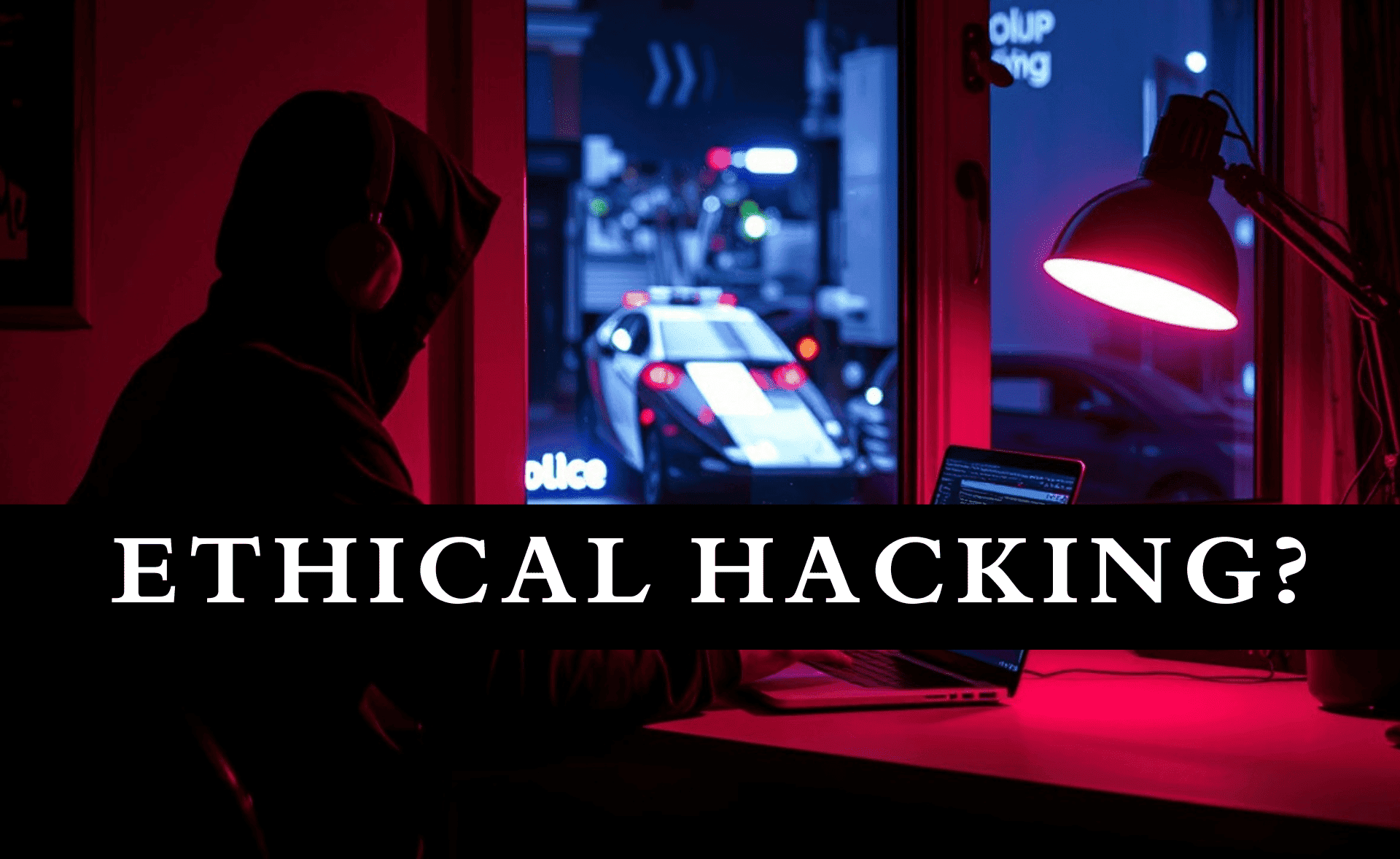Your cart is currently empty!

What is Ethical Hacking? – A Beginner’s Guide to the Hacking World for 2025
Learn the basics of Ethical Hacking in this beginner’s guide. Understand its role in cybersecurity and how it helps protect systems in 2025.
Did you know 60% of businesses worldwide have faced cyberattacks? This shows how vital ethical hacking is today. I’ll guide you through the basics and more of ethical hacking. We’ll look at what it is, why it matters, and the different types of hackers.

A stylish and modern digital illustration showcasing the concept of “Ethical Hacking Guide”. Set against a sleek, minimalist backdrop, the image features a prominent book or manual in the foreground, its cover adorned with a simple, yet elegant design. The book is surrounded by a variety of cybersecurity-themed icons and symbols, such as lock icons, code snippets, and circuit board patterns, all rendered in a muted, sophisticated color palette. Subtle lighting from the top right casts dramatic shadows, adding depth and dimension to the scene. The overall composition conveys a sense of professionalism, expertise, and the intersection of technology and ethical practices.
Table of Contents
Introduction to Ethical Hacking
I’m excited to share my journey into ethical hacking with you. We’ll cover everything from what ethical hacking is to becoming a skilled hacker. We’ll also explore the different types of hackers and the ethical hacking guide.
Key Takeaways
- Understanding what is ethical hacking and its importance in cybersecurity.
- Learning about the different types of hackers and their roles
- Discovering the basics of ethical hacking guide and its applications
- Exploring the various aspects of beginner’s guide to hacking
- Grasping the significance of ethical hacking in today’s digital landscape
- Getting started with the ethical hacking guide and its core principles
Understanding the Foundations of Ethical Hacking
To learn ethical hacking and succeed in the hacking world 2025, you must understand its basics. Ethical hacking is about finding and fixing security weaknesses. It helps protect computer systems, networks, and data from harm.
As I explore ethical hacking, I see how vital it is for a good career. It’s key to know the ethical hacking basics well.
In the hacking world 2025, ethical hacking is essential for digital security. To be an ethical hacker, you need programming, networking, and problem-solving skills. The hacking process includes gathering information, checking for weaknesses, and using them.
Some important tools and skills for ethical hacking are:
- Programming languages like Python and C++
- Networking protocols and architectures
- Vulnerability assessment and penetration testing tools
- Operating system and software knowledge
As I keep learning ethical hacking, I value knowing the legal side of it. Ethical hackers must follow the law and respect privacy and security. By mastering the ethical hacking basics and keeping up with new trends, you can have a fulfilling career in this field.
The Critical Role of Ethical Hackers in Cybersecurity
Exploring cybersecurity shows us how important introduction to ethical hacking is. Ethical hackers help protect us by finding and fixing system weaknesses. For hacking for beginners, learning about ethical hacking is key.
There are many job opportunities for ethical hackers. They are well-paid, making it a great career choice. Ethical hackers can work in:
- Cybersecurity consulting firms
- Government agencies
- Private companies with in-house cybersecurity teams
In summary, ethical hackers are vital in cybersecurity. As technology advances, so will the demand for them. A career in ethical hacking is rewarding and helps protect us all from cyber threats.
What is Ethical Hacking? – A Beginner’s Guide to the Hacking World for 2025
For beginners, knowing what is ethical hacking is key. Ethical hacking, or white-hat hacking, uses hacking skills to find and fix security issues. An ethical hacking guide teaches how to use these skills for good, like protecting against cyber threats.
A beginner’s guide to hacking also talks about different hackers. You’ll learn about white-hat, black-hat, and gray-hat hackers. Knowing these types helps you understand ethical hacking better.
Core Principles of Ethical Hacking
Key principles of ethical hacking include getting permission first and respecting privacy. You should also not hack for personal gain.
Key Differences from Malicious Hacking
Ethical hackers aim to make systems safer, unlike malicious hackers. Malicious hackers want to harm or gain personally from hacking.
Essential Terminology for Beginners
Beginners should know terms like “penetration testing,” “vulnerability assessment,” and “security audit.” These terms describe how to find and fix security problems in systems and networks.
Different Types of Hackers in the Digital Landscape
In the hacking world 2025, there are many types of hackers. Each has their own reasons and ways of working. Knowing about these types is key to understanding ethical hacking basics. The main hackers are white-hat, black-hat, and gray-hat.
White-hat hackers, or ethical hackers, help protect organizations from cyber threats. They use their skills for good. Black-hat hackers, on the other hand, harm systems and steal data. Gray-hat hackers are in between, sometimes using their skills for personal gain but not always with bad intent.
To be an ethical hacker, you need to know a lot. This includes operating systems, networking, and programming. Ethical hackers try to find weaknesses in systems by simulating attacks. They use tools and skills to do this.
The world of hacking is always changing. Ethical hackers must keep learning to stay good at their job. This means they need to know about new technologies and techniques.
- Programming languages such as Python and C++
- Networking protocols such as TCP/IP and DNS
- Operating systems such as Windows and Linux
By learning about different hackers and how they work, we can see why ethical hacking is so important. It helps protect us from cyber threats in the hacking world 2025.
Essential Tools in an Ethical Hacker’s Arsenal
Exploring the world of ethical hacking, I see how vital the right tools are. They help find weaknesses and make security stronger. To learn ethical hacking, knowing these tools is key. An introduction to ethical hacking must cover the essential tools hackers use.
Some important tools are:
- Penetration testing tools to simulate cyber attacks and test defenses
- Network analysis software to monitor and analyze network traffic
- Security assessment frameworks to identify vulnerabilities and provide recommendations
These tools are vital for spotting weaknesses and suggesting fixes. They help hackers learn ethical hacking and grow in their careers.
But, education and certifications are also key for a career in ethical hacking. Taking an introduction to ethical hacking course or getting certified helps. It gives the knowledge and skills needed to excel in this field and keep up with new tools and tech.
Core Skills Required for Ethical Hacking
Starting in ethical hacking means you need to know some key skills. You’ll need to know programming languages like Python and Java. Also, networking and operating system knowledge are important. An ethical hacking guide can help you learn these skills.
Here are some essential skills for ethical hacking:
- Programming languages: Python, Java, C++
- Networking fundamentals: TCP/IP, DNS, DHCP
- Operating system knowledge: Windows, Linux, macOS
On average, an ethical hacker in the U.S. makes about $100,000 a year. But, pay can change based on where you work, how long you’ve been doing it, and the industry.
If you want to be an ethical hacker, there are many ways to learn. Online courses and training programs are great resources. A good hacking for beginners course can teach you the basics of ethical hacking.

An open book with a computer chip and gears, illuminated by a warm, focused spotlight, sits on a clean, minimalist desk. The book’s pages display technical diagrams and lines of code. In the background, a sleek, modern laptop and a pair of hacking-themed icons subtly suggest the tools of the ethical hacking trade. The overall atmosphere conveys a sense of intellectual curiosity, technical proficiency, and a commitment to responsible cybersecurity practices.
The Ethical Hacking Process: Step-by-Step Breakdown
Exploring the world of ethical hacking is key. In the hacking world 2025, ethical hackers are vital. They find weaknesses and stop cyber attacks. The process includes steps like reconnaissance, vulnerability assessment, exploitation, and documentation.
First, ethical hackers gather info about the target system. They use social engineering or network scanning. Then, they check for weaknesses using tools like penetration testing software.
The main steps in ethical hacking are:
- Reconnaissance: gathering information about the target system
- Vulnerability assessment: identifying possible weaknesses in the system
- Exploitation: using the found weaknesses to access the system
- Documentation: recording the findings and suggesting fixes
In the hacking world 2025, knowing what is ethical hacking is vital. It helps organizations defend against cyber threats. By following this process, they can spot vulnerabilities and prevent attacks.
Educational Pathways to Become an Ethical Hacker
To learn ethical hacking, you have many options. You can choose from degree programs, certifications, and online courses. These paths help you understand introduction to ethical hacking. Education and training are key to a career in ethical hacking.
Here are some main ways to become an ethical hacker:
- Degree programs in cybersecurity or related fields
- Certifications such as CEH (Certified Ethical Hacker) or OSCP (Offensive Security Certified Professional)
- Online courses and training programs that focus on learn ethical hacking and provide an introduction to ethical hacking
These paths can lead to jobs in cybersecurity, penetration testing, and vulnerability assessment. Ethical hackers can earn good salaries, from $80,000 to over $150,000. This depends on experience and where you work.
By following these educational paths, you can start a fulfilling career in ethical hacking. You’ll help protect companies from cyber threats.
Professional Certifications in Ethical Hacking
Starting in ethical hacking? You need a strong base in its principles and practices. An ethical hacking guide offers insights and knowledge to begin. Getting professional certifications is key to growing your career. They show your skills and dedication, making you more appealing to employers.
A beginner’s guide to hacking highlights the role of certifications. Some top certifications are:
- CEH (Certified Ethical Hacker)
- OSCP (Offensive Security Certified Professional)
- CompTIA Security+
These certifications are useful in real-world tasks like penetration testing. They boost your skills and knowledge in ethical hacking. This makes you a valuable asset to any company.

A striking close-up photograph of a stack of professional certification documents for ethical hacking, such as CISSP, CEH, GPEN, and OSCP, resting on a sleek, minimalist desk. The certificates are illuminated by soft, diffused lighting, creating a sense of importance and prestige. The frame is composed to emphasize the certifications, with a plain, out-of-focus background suggesting a modern, high-tech environment. The overall mood is one of authority, credibility, and the pursuit of advanced security knowledge.
Remember, a career in ethical hacking needs ongoing learning and growth. Keeping up with new tech and trends is vital. With the right certifications and knowledge, you can have a fulfilling career as an ethical hacker. You’ll help organizations stay safe from cyber threats.
Career Opportunities in Ethical Hacking
Starting in ethical hacking opens doors to many career paths. Ethical hacking basics are useful in finance, healthcare, and government. The job market for these experts is booming.
For beginners, roles like penetration tester, security consultant, and incident response specialist are available. These jobs offer great growth and salaries from $80,000 to over $150,000 a year.
Industry Sectors
- Finance and banking
- Healthcare and medical research
- Government and defense
Job Roles and Responsibilities
- Penetration tester: simulating cyber attacks to test system security
- Security consultant: providing expert advice on cybersecurity measures
- Incident response specialist: responding to and managing cybersecurity incidents
Growth Prospects
The need for ethical hackers is rising fast, with a 30% increase expected in five years. This is because more cybersecurity experts are needed to fight cyber threats.
Salary Expectations and Market Demand
Exploring the hacking world 2025 shows us the importance of ethical hackers’ salaries and demand. These experts are key in keeping companies safe from cyber threats. Their skills are highly sought after.
In the United States, the need for ethical hackers is growing. Companies are ready to pay well for their knowledge. Things like where you live, how long you’ve worked, and your certifications affect your salary. For example, having a CEH or OSCP can lead to higher earnings.
Here are some key points to consider when it comes to salary expectations and market demand:
- Average salary range for ethical hackers in the United States: $100,000 – $200,000 per year
- High demand for ethical hackers in industries like finance, healthcare, and government
- Certifications and education can significantly impact salary expectations
In conclusion, the future looks bright for ethical hackers. With good salaries and high demand, it’s a great career choice for those interested in what is ethical hacking and the hacking world 2025.
Real-World Examples of Ethical Hacking Success Stories
Exploring ethical hacking shows its value in real-world scenarios. It’s key for those interested in this field. Ethical hackers protect us from cyber threats, making a big difference online.
There are different types of hackers. White-hat hackers are the good guys, while black-hat hackers are the bad ones. To learn ethical hacking, knowing these differences is important.
Ethical hackers stop corporate security breaches by finding and fixing weaknesses. This helps organizations stay safe from bad attacks. It’s a big part of introduction to ethical hacking, showing how it keeps our data safe.
Notable Achievements
- Prevention of corporate security breaches
- Protection of government infrastructure
- Identification of vulnerabilities in software and hardware

A spacious office interior with a sleek, modern design. In the foreground, a laptop displaying complex code and security diagrams, surrounded by various hacking tools and equipment. In the middle ground, a professional-looking individual intently focused on the screen, deep in the process of ethical hacking. The background features large windows overlooking a bustling city skyline, bathed in warm, golden afternoon light. The overall atmosphere conveys a sense of focus, innovation, and the responsible application of hacking skills for the greater good.
In summary, ethical hacking success stories show its vital role in keeping us safe. By learning about it, we can help protect the digital world.
Common Challenges and How to Overcome Them
Starting as an ethical hacker can be tough. One big challenge is not having the right education and training. To get past this, following a detailed ethical hacking guide is key. It should teach the basics of hacking for beginners.
Other challenges include keeping up with new tech and working under pressure. To tackle these, having a solid grasp of ethical hacking principles is vital. Also, always update your skills and knowledge.
Here are some tips for overcoming common challenges in ethical hacking:
- Stay current with the latest technologies and techniques
- Continuously update your skills and knowledge
- Join online communities and forums to network with other ethical hackers
By following these tips and staying committed to your education and training, you can overcome the common challenges of ethical hacking and succeed in this rewarding and challenging field. Remember to always follow a reliable ethical hacking guide and to practice your skills in a safe and legal environment, focusing on hacking for beginners concepts.
Future Trends in Ethical Hacking for 2025 and Beyond
As we look into the hacking world 2025, it’s key to grasp the future of ethical hacking. This field keeps changing, with new tech and methods popping up yearly. Knowing what is ethical hacking and its uses is vital.
Emerging trends include using artificial intelligence and machine learning to fight cyber threats. The hacking world 2025 will also focus more on cloud security, as more businesses go online. Also, the need for skilled ethical hackers will grow, with salaries from $100,000 to over $200,000 yearly.
To keep up, updating your skills and knowledge is a must. You can do this with online courses, workshops, and conferences. Notable resources include the Certified Ethical Hacker (CEH) and the Offensive Security Certified Professional (OSCP) certifications.
In conclusion, ethical hacking’s future is bright, with new trends and tech coming each year. By understanding what is ethical hacking and keeping up with new developments, you can have a rewarding career. You’ll help grow the hacking world 2025.
Conclusion: Starting Your Journey in Ethical Hacking
As we wrap up this beginner’s guide to ethical hacking, I hope you now understand this field well. Ethical hacking is not just a job; it’s a way to protect our digital world and our important assets.
If you’re excited about learning ethical hacking or passionate about cybersecurity, you’re in for a great adventure. You can become a key player in keeping organizations, governments, and people safe. Your skills will help find weaknesses and strengthen defenses against bad attacks.
The path to becoming an ethical hacker might be tough, but it’s worth it. Start by looking into educational paths and professional certifications mentioned in this guide. Dive into the latest tools and methods used by top experts in the field.
As an ethical hacker, your job is to protect, not harm. You’re a white hat in a world of black hats. Take on this role with pride and let your skills help make the digital world safer for everyone.
FAQ
What is ethical hacking?
Ethical hacking, also known as penetration testing or white-hat hacking, is a way to find and fix security weaknesses in systems or networks. It uses the same methods as malicious hackers but with a good purpose. The goal is to help protect against cyber threats.
What are the different types of hackers?
There are three main types of hackers: – White-hat hackers: These are the good guys who help find and fix security issues. They are often hired by companies for security checks. – Black-hat hackers: These are the bad guys who use their skills for harm, like stealing money or data. – Gray-hat hackers: They are in a middle ground, sometimes breaking the law but not always with bad intent.
What are the steps involved in an ethical hacking process?
The steps in ethical hacking are: 1. Reconnaissance: Gathering info about the target system or network. 2. Vulnerability assessment: Finding and analyzing security weaknesses. 3. Exploitation: Trying to use the weaknesses for a test. 4. Post-exploitation: Seeing how successful the test was. 5. Reporting and remediation: Writing up the findings and suggesting fixes.
What tools are used in ethical hacking?
Ethical hackers use many tools, including: – Penetration testing tools: Like Kali Linux, Metasploit, and Burp Suite, for finding and using weaknesses. – Network analysis software: Wireshark is used to watch and study network traffic. – Security assessment frameworks: OWASP and NIST guidelines help in a structured way to check security.
What skills are required for ethical hacking?
Good ethical hackers need skills like: – Programming and scripting: Knowing languages like Python, Bash, and Java. – Networking basics: Understanding TCP/IP, routing, and network protocols. – Operating system knowledge: Being good with Windows, Linux, and macOS. – Vulnerability analysis: Knowing how to find and use security weaknesses. – Problem-solving and critical thinking: Needed for solving complex security problems.
What are the educational pathways and certifications for ethical hacking?
To become an ethical hacker, you can: – Get a degree in cybersecurity, computer science, or IT. – Get certifications like CEH, OSCP, and CompTIA Security+. – Take online courses or boot camps for hands-on training.
What are the career opportunities and salary expectations in ethical hacking?
Ethical hacking is in high demand, with many jobs available. Roles include: – Penetration tester: Finds and fixes security weaknesses. – Security analyst: Looks at security data and finds solutions. – Incident response specialist: Deals with security issues. – Salaries range from $60,000 to $120,000 or more, based on experience and certifications.
What are some real-world examples of successful ethical hacking?
Ethical hackers have helped protect many organizations and people from cyber threats. They have: – Prevented data breaches: Found and fixed vulnerabilities in big companies. – Secured government systems: Helped protect critical government networks. – Notable hackers: People like Keren Elazari and Kevin Mitnick have made big contributions to cybersecurity.


